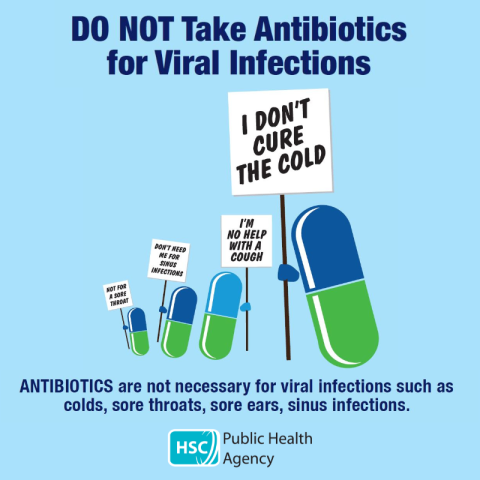Preventing antimicrobial resistance together

The future of antibiotics depends on all of us using them properly, so during of World Antibiotics Awareness Week (18-24 November) the Public Health Agency (PHA) has joined with the Chief Medical Officer and Chief Veterinary Officer in asking everyone to help prevent antimicrobial resistance.
CMO Professor Sir Michael McBride said: “Antimicrobial resistance (AMR) is a serious and growing global public health concern. The use of antibiotics is essential for saving lives, and without effective antibiotics, even minor surgery and routine operations could become high risk procedures due to the increased likelihood of infection by resistant organisms. Reducing our use of antibiotics is one of the best ways we can tackle this growing crisis. We should only take antibiotics when they are necessary and when they are prescribed to us by our doctor.
“The Department of Health will continue to work in partnership with stakeholders within a ‘One Health’ approach to ensure antibiotics keep working.”
Antimicrobial resistance (AMR) occurs when bacteria, viruses, fungi and parasites change over time and no longer respond to medicines, making infections harder to treat and increasing the risk of disease spread, severe illness and death. As a result of drug resistance, antibiotics and other antimicrobial medicines become less effective and infections become increasingly difficult or impossible to treat.
Dr Emma Hunter from the PHA, said: “If we continue to use antibiotics at the current rate, we could face a return to the days before they existed, when people died from simple infections and where the risk of infection made routine surgery life threatening.
“Antibiotics are important medicines used to treat infections caused by bacteria, but because they are not always used appropriately, bacteria are becoming resistant. As a result, some antibiotics have become less effective against the bacterial infections they were designed to treat. Infections caused by resistant bacteria can be very difficult to treat and can be serious. In recent years, few new antibiotics have been discovered. We need to protect the antibiotics we have to ensure they continue to work now and in the future.”
Antibiotic resistance is a threat to you and your family’s health. But you can help by taking some simple steps:
- Only take antibiotics when they are prescribed by your doctor.
- Remember, antibiotics are not effective against viral infections, such as a cold or flu. Most coughs, sore throats or earaches do not need antibiotics. Your body can usually fight these infections on its own.
- Your local pharmacist can provide advice and there are over-the-counter medicines to help manage your symptoms.
- If you’re worried, speak to a doctor who will be able to advise you on the best treatment. If your doctor prescribes an antibiotic make sure you take it according to the instructions. Make sure you complete the course and don’t just stop because you’re feeling better.
- It’s also extremely important that you never share antibiotics with anyone else or use leftover antibiotics.
Research has shown that a continued rise in antibiotic resistance could, by 2050, lead to 10 million people dying every year as a result. If each of us follows the simple steps above we can all keep antibiotics working for the future.
DAERA’s Chief Veterinary Officer, Dr Robert Huey, said: “New global research reports that bacterial AMR has become a leading cause of human deaths worldwide and is killing about 3,500 people every day. If left unchecked, deaths are expected to reach 10 million per year by 2050. AMR is a major threat to humans, animals, plants and the environment so a cross-sectoral ‘One Health’ approach is needed to reduce the need for antimicrobials and minimise the further development of AMR. ‘Preventing antimicrobial resistance together’ is the only option which will keep antibiotics working for everyone: citizens, patients, doctors, pharmacists, veterinarians, farmers, and policy makers.”
For more info on antibiotics and antibiotic resistance, visit www.pha.site/antibiotics
We’re running out of time to act – here’s how to play your part
- Most simple infections clear up on their own. You can visit your pharmacist for advice. Over-the-counter medicines may help you to manage your symptoms.
- If you do see your doctor, they’ll assess your symptoms and advise you on the correct treatment. Take your doctor’s advice and don’t demand antibiotics.
- If your doctor prescribes an antibiotic make sure you take it according to your doctor’s instructions.
- Complete the course and don’t just stop because you’re feeling a bit better.
- Never share antibiotics with anyone else.
Antibiotics don’t work against the flu or COVID 19, but getting your winter vaccinations if eligible can help. For further information on the winter vaccines see www.nidirect.gov.uk/wintervaccines
- Department of Agriculture, Environment and Rural Affairs (DAERA), the Department of Health (DoH) and the Food Standards Agency NI (FSANI), are working together to address antimicrobial resistance and deliver the action plan for tackling AMR in Northern Ireland Changing the Culture 2019-2024”: One Health.
- Changing the Culture 2019-2024: One Health is published on the Department of Health website.
